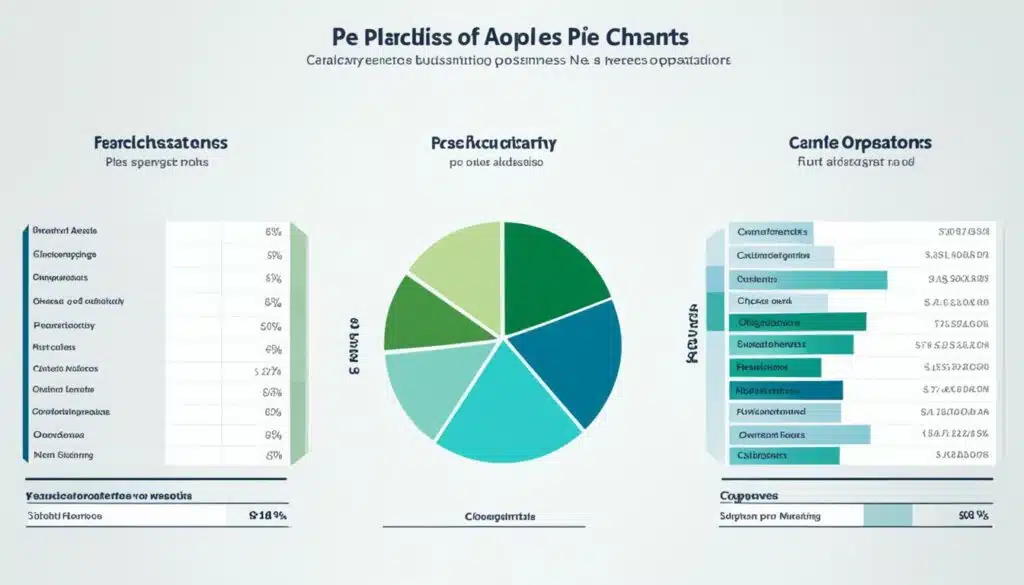Finance Planning : Creating a successful business needs a solid financial plan. This plan is a key part of the overall business plan. It uses real financial info and forecasts to support the rest of the plan.
It looks ahead and is crucial for talking with the team, investors, and steering the company’s growth. A solid financial plan helps set clear business targets, manage cash flow better, decide on budgets, spot savings chances, lower risks, get ready for bad times, bring in investors, show how the business will grow, and keep things clear with staff.
Key Takeaways
- Financial planning is essential for communicating with staff, investors, and managing a company’s growth.
- A financial plan helps establish clear business goals and improve cash flow management.
- Financial planning facilitates budget allocation and identifies cost savings opportunities.
- It mitigates financial risks and prepares for crises and contingencies.
- A financial plan attracts investors and supports business growth projections.
Understanding Financial Planning for Businesses
Successful businesses know the value of financial planning. A financial plan is a key part of a business plan. It uses real data and future projections to guide business strategies. It’s crucial for sharing with employees, investors, and steering the company’s growth.
What Is a Financial Plan?
A financial plan outlines a business’s monetary goals, tactics, and visions. It shows cash flows, incomes, and detailed budgets. This acts like a map, steering the company’s financial moves to meet its big goals.
The Importance of Financial Planning
- Helps businesses set clear, measurable financial goals and track progress
- Enables effective cash flow management by forecasting income and expenses
- Facilitates budget allocation to ensure resources are utilized efficiently
- Identifies cost-saving opportunities and areas for improved financial efficiency
- Mitigates financial risks and prepares the business for crisis and contingencies
- Attracts investors by demonstrating a well-structured, data-driven approach
- Supports business growth projections and long-term planning
- Promotes transparency with employees, fostering trust and aligning goals
Financial planning is key for all businesses. It offers a solid structure for managing money, reaching aims, and ensuring steady growth.
Establishes Clear Business Goals

Financial planning brings lots of advantages. One big plus is making business goals clear and doable. It shows what the company aims for in the short and long term. This way, everyone knows what to work towards. The financial plan acts like a guide for growth.
It also helps businesses…
- Connect their money plans with their work plans to hit their targets.
- Set up yardsticks to measure how well they meet their financial planning goals.
- Use money wisely to reach their business objectives.
- Tell everyone the same big picture, from workers to backers and lenders.
Good financial planning adds a few more benefits.
- Think ahead about tough spots or lucky breaks that might come up.
- Change plans when the market or industry shifts.
- Check if new business goals are doable and profitable.
Doing financial planning right sets up businesses to do well over the long haul. This way, they can really grow and succeed.
“Clearly defined business goals are essential for guiding strategic decision-making and measuring the success of a company’s financial planning efforts.”
Improves Cash Flow Management
For business success, managing cash flow is key. A detailed financial plan gives a grip on what money comes in and goes out. This lets businesses deal with any money troubles before they become big problems.
Tracking Income and Expenses
A financial plan must keep an eye on what money comes in and goes out. It helps spot trends and chances to make your cash flow better. Monitoring your income and spending helps in making smart choices on how to spend and save money.
Being smart about cash flow helps companies deal with ups and downs better. They are ready for any surprises because they know their money well. This makes their financial future more secure and sets them up for long-term success.
“Effective cash flow management is the cornerstone of financial planning for businesses. It allows you to anticipate and address cash flow challenges, ensuring your company’s long-term viability and growth.”
When cash flow is part of a company’s bigger financial plan, they can do better. They make decisions based on a solid understanding of their finances. This helps use resources better and prepare for success down the road.
Facilitates Budget Allocation

A strong financial planning process is key to effective budget allocation in businesses. It lets companies split their main budget into smaller ones for each team. This way, all areas get the funding they need to meet their goals.
By going through this detailed budgeting process, businesses can spend money wisely. They can manage their costs better and put resources where they are most needed. This planning makes sure every dime spent helps the business succeed.
The budget planning includes steps like looking at old financial data. This shows spending patterns. Companies also look to the future by estimating revenue and costs. Then, they decide where to spend money based on what will give the best results. Lastly, budgets are checked and adjusted as needed.
With a strong financial planning and budget allocation strategy, companies can make the most of their resources. This leads to a better chance of long-term growth and success.
“Budgeting is not just about numbers, it’s about prioritizing your resources to achieve your goals.”
Good budget planning and allocation is crucial in the big picture of financial planning. This part involves connecting money with the company’s goals. By constantly checking and adjusting the budget, businesses use their funds smarter. This way, every spending choice pushes for growth and profit.
Identifies Cost Savings Opportunities
 Good financial planning helps companies spend less and find savings. They watch where money goes and see where they can spend smarter or less. This helps move money to better uses or save it for later.
Good financial planning helps companies spend less and find savings. They watch where money goes and see where they can spend smarter or less. This helps move money to better uses or save it for later.
Spend Control and Efficiency
Planning money well can make a business use its money better. It looks at past spending, makes tight budgets, and cuts costs where it can. Doing this, companies save money to grow or be stronger when times are tough.
Looking for savings is important in planning well. It lets businesses check their budgets, find spots where they overspend, and cut it back. This might mean getting better deals from suppliers, using less stock, or making work smoother.
| Cost Savings Strategies | Potential Benefits |
|---|---|
| Vendor contract renegotiation | Reduced procurement costs, improved terms and conditions |
| Inventory optimization | Minimized carrying costs, improved cash flow |
| Process automation | Increased efficiency, reduced labor costs |
| Energy efficiency initiatives | Lower utility expenses, environmental sustainability |
With these methods and more, companies can work smarter. They use their money better and save, making them more successful in the long run.
“Effective financial planning is the cornerstone of sustainable cost savings and improved financial efficiency for businesses.”
Mitigates Financial Risks

Companies must plan well to predict and lessen financial risks. A solid financial strategy should prepare for tough times, like economic dips, new laws, or big, unexpected costs. It should also list what the company will do if these issues arise.
Managing risk this way helps companies get ready for the worst and react well. This keeps their finances stable and growing. Planning for financial risk means a better chance of staying strong over time, no matter what the market does.
Identifying Potential Risks
The first step to cutting financial risks is spotting what could go wrong. This might involve:
- Economic shifts that hit your sales and profit
- Regulations in your industry or new laws that change how you work
- Surprise costs like a broken machine or a big storm
- Supply chain problems that slow down your work or money coming in
Knowing these risks early lets businesses prepare in ways that lessen their effects. This is key for staying financially sound.
Implementing Risk Mitigation Strategies
After finding the risks, a solid financial plan should have ways to handle them. This could mean:
- Getting income from different places to not depend on just one
- Having enough money set aside for surprises
- Buying the right insurance to cover possible losses
- Having plans in place to act fast when things go wrong
- Keeping the financial plan updated as conditions change
Using these strategies in planning helps businesses stay secure and ready for challenges.
“Effective financial planning is not just about maximizing profits, but also about managing and mitigating the risks that can threaten a business’s financial stability and growth.”
To wrap up, good financial planning is crucial for facing and lessening risks. By being ready for potential troubles and taking strategic risk management steps, businesses can safeguard their financial health. This sets them up for success in the long run.
Prepares for Crisis and Contingencies
Every business needs a solid financial plan to steer through unexpected events. Such a financial plan must include different forecasts for various growth situations. This allows the business to adjust quickly when situations change. Being prepared in advance helps companies to stay financially strong and keep running during tough times.
Financial planning for contingencies is key for businesses to handle crises well and keep growing. It enables them to:
- Spot potential risks and come up with solutions
- Use resources wisely for financial stability in hard times
- Change their operations fast to stay profitable
- Talk openly with everyone involved and gain their trust during tough times
Integrating crisis planning and contingency planning into a business’s finances shows a dedication to resilience and long-term health. This approach doesn’t just help businesses get through crises but also prepares them for success in the future.
“Effective financial planning is the key to navigating crises and unexpected events. It’s not just about the numbers – it’s about building a roadmap to resilience and growth.”
By making financial planning for contingencies a priority, a business can be ready for whatever challenges it faces. This readiness is crucial for their ongoing success and lasting power.
| Benefits of Contingency Planning | Key Considerations |
|---|---|
|
|
Finance Planning Attracts Investors
 A strong financial plan can greatly help a business attract investors. Investors closely look at a company’s financial plan to judge its health and potential risks. Showing a smart and data-driven financial plan makes the business more appealing to investors.
A strong financial plan can greatly help a business attract investors. Investors closely look at a company’s financial plan to judge its health and potential risks. Showing a smart and data-driven financial plan makes the business more appealing to investors.
Businesses that show they are good with money and have plans for growth attract investor interest. A detailed financial plan shows a business is serious about its future. It also shows it can make smart decisions and spend money wisely. This makes investors more likely to put their money in the company.
A solid financial plan acts like a guide for investors. It gives them a snapshot of the business’s money situation and future plans. This kind of clear and honest information is key for investors. It shows the team is careful with money and can overcome market obstacles well.
| Key Benefits of a Robust Financial Plan for Investor Attraction |
|---|
|
Working on a detailed financial plan makes businesses more enticing to investors. It boosts their chances of getting the funding they need for growth and success.
“A well-crafted financial plan is not just a tool for internal management, but a powerful means of communicating the company’s financial strength and growth potential to potential investors.”
Supports Business Growth Projections

For business growth planning, you need a good financial planning for growth strategy. This plan should not just show the company’s current financial state. It should also map out future growth projections. This approach helps companies use their money and investment plans wisely. It ensures they move towards their long-term growth goals well.
Creating solid business growth planning projections is a major benefit. This is done by looking at past data, what the market is doing now, and future opportunities. From this, businesses can figure out their incomes, costs, and what money they will need. This helps in making smart choices about where to put their money. It might be in growing the business, making it bigger, or other important plans that help the company grow.
Growth projections in the financial plan also attract investors. A detailed and smart business growth planning plan shows that a business is worth investing in. This is key for new businesses or anyone looking to get more money to help them grow.
“Having a comprehensive financial plan that supports our growth projections has been instrumental in our ability to secure funding and execute our expansion strategy effectively.” – CEO, XYZ Corporation
In short, financial planning for growth is key for business growth planning and success in the long run. It aligns a company’s money with its growth goals. Plus, it offers clear growth projections that guide the company in sustainable growth.
Promotes Transparency with Employees
Financial planning is key to any company’s success. It’s not just about making money. It’s about being open with employees. This openness makes everyone trust the company more. It also helps them understand the company’s goals and how they fit in. By sharing financial info, companies build stronger connections with their team.
When employees know about the company’s finances, they feel more connected. They understand how their work impacts the business. This leads to a culture where everyone feels responsible for the company’s financial health. Knowing the company’s future plans makes them feel like a valuable part of the team. So, they make choices that help meet these goals.
Being transparent with financial plans also boosts employee communication. Discussing the company’s financial health helps build trust with the team. It encourages open discussions. Employees can share their thoughts and ideas. This feedback is crucial as it can point out areas needing improvement. It ensures that everyone is on board with the company’s financial plans.
When companies involve employees in financial planning, it boosts morale. Tapping into their insights makes them feel important. They trust their leaders more. This trust makes them happier in their jobs. They’re less likely to leave. Plus, they’re more dedicated to helping the company succeed in the long run.
“Transparency is the new currency of business. Embracing it can transform your company and your career.”
Considering financial planning in how a company engages with its employees is smart. It fosters a culture of honesty and teamwork. Such an environment benefits both the company and its workers. It helps the company financially. But it also aids in the personal and professional growth of its employees, who are its biggest assets.
Finance Planning
 Crafting a long-lasting financial plan is key for success in business. This process helps set clear goals, manage money flow, use resources well, and spot places to save money. It also helps handle risks and plan for emergencies. With a good finance planning for businesses process, companies can overcome obstacles and take every chance to grow.
Crafting a long-lasting financial plan is key for success in business. This process helps set clear goals, manage money flow, use resources well, and spot places to save money. It also helps handle risks and plan for emergencies. With a good finance planning for businesses process, companies can overcome obstacles and take every chance to grow.
The core of finance planning is creating a detailed plan. This plan is like a map, showing the way to the company’s financial goals. It matches the financial choices with the main business goals. This way, how money is used and where resources go helps the business grow and make more money.
Key Elements of Effective Financial Planning
Best practices in financial planning best practices include:
- Setting goals for how much money to make, where to spend less, and what to invest in.
- Watching the flow of money closely to keep things running smoothly.
- Using money wisely in different parts of the business to meet strategic goals.
- Finding ways to save money and operate more efficiently.
- Planning for financial risks like changes in the market or new expenses.
- Having plans ready for when challenges come up or new opportunities arise.
By putting these into the financial planning process, businesses come up with a strong plan. This plan supports growth and longevity.
“Successful financial planning isn’t just about numbers. It links your financial moves to the business’s goals for lasting growth.”
Ultimately, the finance planning for businesses method helps companies make smart choices. It uses resources well and positions them for success in a fierce competing market.
Also Read : How Does Litigation Financing Empower Plaintiffs And Law Firms?
Conclusion
Finance planning is crucial for business success. A good plan helps set clear goals and manage cash better. It shows how to spend money wisely and cut costs where you can.
It also makes it easier to handle financial risks and get through tough times. A solid financial plan brings in investors, supports growth, and keeps your employees in the loop. It’s like a roadmap for staying financially healthy and making smart choices.
Spending time and money on a finance plan is a must for any business. It helps them face today’s business challenges head-on. With a plan, companies can grow and last, knowing their financial future is secure. So, planning your finances well is where the success of your business starts. No matter the size – startup, small, or big – a detailed finance plan is essential. Use the tips mentioned here to steer your business towards lasting success and financial safety.






